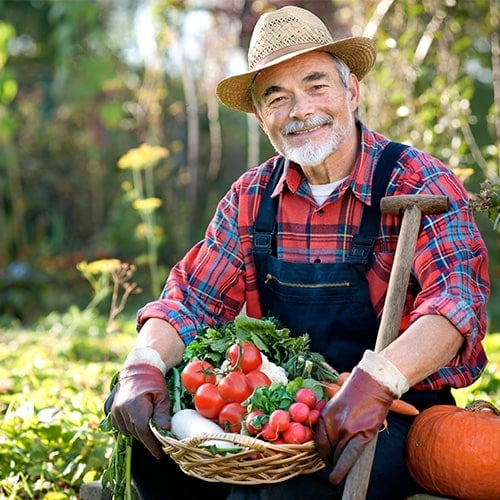Farm to Table: A Movement for Local and Organic Food
The farm to table movement has been growing for years, and since its beginning, people have wondered if it's simply a passing fad or a new mainstay in the restaurant industry. Years later, farm to table is still going strong, so we can safely assume that it's here to stay. Because of its incredible growth and popularity, it's important that restaurant owners understand what the farm to table movement is, its history, and the pros and cons of opening a farm to table establishment.
What Is Farm to Table?
Farm to table, also known as farm to fork, can be defined as a social movement where restaurants source their ingredients from local farms, usually through direct acquisition from a farmer. Most traditional restaurants get their produce from other parts of the country or around the world. These ingredients need to be shipped long distances, and as a result, they are usually picked before they are ripe to lengthen their lifespan, or they are frozen to prevent spoiling. All of this results in food that is bland and less nutritious.
On the other hand, farm to fork restaurants get their food from local farms, so the food is picked at peak freshness and is bursting with flavors and vitamins. Because the produce is usually very flavorful, many farm to table operations don't dress their food up with complex sauces and overpowering flavors, instead preferring to let the freshness and flavor of the food speak for itself.
History of Farm to Table

The roots of the farm to fork trend stretch back to the 1960s and 70s when Americans became increasingly dissatisfied with processed foods that they found bland. One of the first farm to table restaurants that opened up was Chez Panisse in Berkeley, California in 1971. Chez Panisse was opened by Chef Alice Waters, who wanted to use produce from local organic farms because it was more flavorful and fresh than produce used by other restaurants.
Chez Panisse became very successful, and the farm to table movement began to grow steadily during the late decades of the 20th century. But, the movement didn't explode in popularity until the 2000s when farm to table places started to open up in cities like Boulder, Colorado and Seattle, Washington. Nowadays, you can find farm to fork restaurants in cities all across the country.
Pros and Cons of Farm to Table
The farm to fork movement has come a long way since Alice Waters first opened Chez Panisse. It's now one of the fastest growing food trends in the U.S., but it has its downsides as well. Here we'll break down the pros and cons of farm to fork and it's impact on the restaurant industry.
Pros of Farm to Table:

The farm to table movement has had a huge impact on the foodservice industry and how restaurants source and prepare their food. Here are some of the main benefits of farm to fork:
- Farm to fork helps to boost the local economy and support local farmers. Because farm to table restaurants deal directly with the farmer, you can be sure that the money spent is going directly to helping farmers grow their businesses and fuel the local economy.
- Both the restaurant and farmer benefit from farm to table. The restaurant gets delicious and fresh produce, and the farmer gets recognition for their hard work as well as guaranteed business. Additionally, farm to fork restaurants that have a close relationship with one particular farm can usually request that they plant certain foods.
- Serving farm to table food at your restaurant is an excellent way to make local and organic food more available to your community.
- Farm to fork is an extremely popular trend, and associating your restaurant with the trend can help bring in customers and create excitement about your menu.
- It can help the environment. The produce doesn't have to be shipped long distances, meaning less time on a truck and fewer greenhouse gases going into the atmosphere.
Cons of Farm to Table:

The farm to fork movement isn't perfect, and in recent years, people have grown increasingly skeptical of establishments that claim to serve farm to table food. So before you decide to open a farm to table restaurant, here are some things to think about:
- If you're planning on opening a farm to fork restaurant, you'll have to constantly change your menu. As the seasons change, different foods will be available in farms, and you'll have to adapt to what produce is available and fresh.
- In the past, some restaurants have taken advantage of the buzzword for their own gain by claiming to be farm to table without actually using local ingredients. Since then, there has been more skepticism about the authenticity of restaurants that claim to be farm to table.
- One of the many reasons that restaurants lie about serving farm to table is the high cost. It is very expensive to run a local and organic farm while competing with mega farms, and as a result, their produce costs a premium. Cows, pigs, and fish are especially expensive to raise, so you're going to pay a large sum for authentic farm to fork meat and seafood.
- To make a profit, many farm to fork operations have to offer their food at a higher price to cover the high cost of the produce. While this may not be an issue in larger cities like New York City and Los Angeles, the price may put off customers in suburban or rural settings.
Farm to table started out as an offshoot of the hippie movement on the West Coast in the 1960s and 70s, but it has since grown into a worldwide phenomenon that doesn’t show any sign of slowing down. And while some restaurants have abused the farm to table name for their own gain, many restaurateurs are using farm to table to give credit to hardworking farmers and bring fresh and delicious food to the general population.
Related Resources

Growing a Culinary Garden for Your Restaurant
Home-growing produce for your commercial kitchen is a great way to give your dishes fresher flavors. With flowers, herbs, fruits, and vegetables growing only feet from your kitchen, your customers will not only taste stronger flavors on their plates, but they'll also experience the satisfaction of seeing exactly where their food came from. What are the Benefits of a Culinary Garden? Larger Stock - Growing your own herbs and produce is a surefire way to know where your food came from. When other restaurants are worried about recalls or shortages, you’ll still be fully stocked. You can also grow uncommon herbs that can give your dishes unique flavors! Fresher, Better-Tasting Ingredients - Since the ingredients are growing only feet from your kitchen, they retain their strong flavors. Herbs sitting on a shelf lose their flavors over time. Having a culinary garden allows you to skip the storage shelf, resulting in better-tasting ingredients. Less Expensive - A packet of seeds will set you back a couple of dollars at most. Maintaining a small herb garden costs less than buying the same produce in a store or market. Environmental Benefits - Most people know that plants help filter the air we need to breathe, but using home-grown ingredients in your commercial cooking also cuts down on the packaging that store-bought produce comes in. Less packaging means less waste in landfills. It also cuts out a huge amount of carbon emissions that result from the transportation of goods from the farm to the store to the kitchen. Sense of Fulfillment - Tending to a garden can bring a tremendous sense of accomplishment and fulfillment. Studies suggest gardening can actually reduce the risk of diseases like depression and improve your mood. You can even use the garden as a team-building exercise to create a happier, more cohesive staff. Free Landscaping - In addition to their functionality, gardens also provide beautiful landscaping for any facility. Your customers will love having the leafy green plants and colorful flowers around, especially if your dining area is outside. Novelty - Culinary gardens are becoming popular in the same way that farm-to-table restaurants and locally-grown food have. Knowing where your ingredients come from makes it easier to know they are all-natural, with no pesticides or preservatives. Where Can I Build a Garden? It doesn’t matter where your restaurant is – you have plenty of space for a small herb or vegetable garden. Establishments in suburbs or country areas can easily build the garden on the lawn or behind the kitchen, for easy access. Restaurants in the city tend not to have much, if any, yard space, but that doesn’t mean you can’t have a culinary garden! Urban agriculture is making a comeback. This can mean window boxes, rooftop gardens, or even plants on the fire escape. It doesn’t take very much space to grow fresh vegetables and herbs because just a few planters can be used to grow a wide variety. The plants themselves will stay small because you’ll constantly be using the leaves for cooking. What Can I Grow? To save space, different herbs can be planted in the same bed or planter. The golden rule for growing herbs together is that you should only combine herbs that require similar conditions. For instance, Mediterranean varieties like rosemary, oregano, lavender, sage, marjoram, and thyme require drier soil and lots of sunlight. Plants like parsley, basil, tarragon, and cilantro like lots of water and can grow in shadier areas. Always be sure to match up the growing information before you combine plants. You can also grow fresh vegetables and fruits in planters and small culinary gardens! Tomatoes, green beans, cucumbers, and peas are all great choices because they can be trained to run vertically up trellises, maximizing your space. Popular fruits include strawberries and cantaloupes because they stay low to the ground, as opposed to tall fruit trees which take up much more room. To add some color to your garden, you can also think about adding edible flowers. Violets and roses can be used as sweet garnishes on desserts, while bright blue borage petals taste like cucumbers and can be used in salads. Edible flowers are a beautiful, creative way to incorporate color into your culinary garden and your menu. Fresh herbs, fruits, and veggies add fresh flavors to your signature dishes and look great in window boxes, pots, and plots of land. So whether you’re looking to expand the menu at your family Italian bistro or find a new draw your urban rooftop restaurant, a culinary garden might be a good option for you.

Seasonal Fruits and Vegetables in Your Region
When are pears in season? What are some examples of fall fruits? With so many fruits and vegetables being imported from other states and countries, it can be hard to know what fruits are in season around your restaurant, cafe, or bar. Modern consumers will pay more for local and organic fresh vegetables and fruits. You can take advantage of this restaurant trend and boost your profits by famililiarizing yourself with your region's seasonal produce cycles If your establishment doesn’t have its own culinary garden, it likely obtains produce to use in foods and recipes from another source. Whether you operate a restaurant or a juice bar, your establishment stands to benefit from using in-season produce in recipes. Although non-local and out-of-season produce gets the job done, many people prefer the various benefits that come with eating seasonally, shifting the focus of restaurants towards locally grown, in-season food. Shop All Fruits and Vegetables Use this link to jump to our interactive seasonal produce chart: Seasonal Produce Calendar Eating Seasonally There are many benefits to eating in-season produce, both for your own health and for the environment’s sake. Lovers of fruits and vegetables will likely get much more out of eating produce that is in season than they would from eating frozen produce. Here are just a few of the benefits of eating in-season vegetables and fruits. More Nutrition - On average, seasonal fruits and vegetables contain many more nutrients than their frozen, out-of-season counterparts. The process of preserving and protecting fruits and vegetables for long-term storage can sap produce of their nutritional value, meaning in-season produce will almost always be packed with more nutrients. Better Taste - In addition to being more nutritious, in-season fruits and vegetables are often thought of as better tasting than out-of-season produce. Farmers that look to mass-produce fruits and vegetables prioritize shelf-life over taste, allowing the produce to be stored for long periods and survive being shipped across the country. As a result, you’ll often find that locally grown in-season vegetables have much more flavor. Lower Costs - In-season produce is often much cheaper due to its abundant supply. On the other hand, out-of-season produce isn’t as plentiful, resulting in higher prices. Additionally, extra costs need to be added to out-of-season produce to cover aspects such as transportation and preservation, further inflating prices. Due to this, eating in-season produce is not only good for your health, but it’s great for your wallet. Reduced Carbon Footprint - Consuming in-season vegetables and fruit is a great way to reduce your carbon footprint and have a positive impact on the environment. Out-of-season produce typically requires hundreds of miles of transportation, which results in the burning of many fossil fuels and emissions entering the atmosphere. If you eat local in-season produce, your food doesn’t have to travel as far to reach you, greatly cutting back on emissions. Decreased Pesticide Consumption - Out-of-season produce is usually filled with a variety of pesticides and preservatives to maintain freshness and quality throughout the food’s entire journey. Although properly cleaning out-of-season fruits and vegetables can remove some chemicals, there may be some remaining. However, in-season vegetables and fruits don’t require as much preservation through chemicals, meaning eating in-season produce will greatly reduce the number of pesticides you consume. What Produce Is in Season? Depending on what time of the year it is and what region of the United States you are located in, different produce will be in season. For example, spring produce in the Northeast consists of foods such as mushrooms, rhubarb, and cherries, while spring produce in the Southwest includes corn, avocados, and strawberries. Learning what fruits and vegetables are in season in your region is important if you’re looking to use fresh ingredients and create the best dishes possible. Produce Calendar Cooking with local, fresh seasonal vegetables and herbs is delicious, healthy, and easy to do with this convenient guide. We've broken down the contiguous United States into regions, so you can see the fruits and vegetables in season in your part of the country all year round. As you explore, it’s important to keep in mind that these lists may vary depending on where you live, even within a certain region. Be sure to research your area using information from your local government or food guides to find what vegetables are in season near you. <label class="subtlelabel">Select a season</label> Spring Summer Fall Winter <label class="subtlelabel">Select a region</label> Fall Vegetables and Fruits in the Northwest There is no shortage of delicious fall vegetables available in the Northwest, including bulbs like fennel, garlic, leeks, and onions, all of which are perfect for seasoning dishes or making sauces. If your business serves a lot of salads, you'll also love the Northwest's selection of arugula, carrots, cucumbers, kale, lettuce, mushrooms, peppers, salad greens, spinach, and tomatoes. <label class="produce-title">Apples</label> <label class="produce-title">Artichokes</label> <label class="produce-title">Arugula</label> <label class="produce-title">Beets</label> <label class="produce-title">Brussels Sprouts</label> <label class="produce-title">Cabbage</label> <label class="produce-title">Cantaloupes</label> <label class="produce-title">Carrots</label> <label class="produce-title">Celery</label> <label class="produce-title">Chard</label> <label class="produce-title">Collards</label> <label class="produce-title">Corn</label> <label class="produce-title">Cucumbers</label> <label class="produce-title">Eggplant</label> <label class="produce-title">Fennel</label> <label class="produce-title">Garlic</label> <label class="produce-title">Grapes</label> <label class="produce-title">Kale</label> <label class="produce-title">Leeks</label> <label class="produce-title">Lettuce</label> <label class="produce-title">Mushrooms</label> <label class="produce-title">Onions</label> <label class="produce-title">Parsnips</label> <label class="produce-title">Pears</label> <label class="produce-title">Peppers</label> <label class="produce-title">Potatoes</label> <label class="produce-title">Pumpkins</label> <label class="produce-title">Radishes</label> <label class="produce-title">Salad Greens</label> <label class="produce-title">Spinach</label> <label class="produce-title">Squash</label> <label class="produce-title">Tomatoes</label> <label class="produce-title">Turnips</label> <label class="produce-title">Zucchini</label> Fall Vegetables and Fruits in the Midwest Green, seasonal vegetables are abundant in the Midwest during the autumn months, such as broccoli, celery, cucumbers, kale, lettuce, spinach, and zucchini. There are also plenty of leafy greens available, like broccoli, brussels sprouts, cabbage, and cauliflower. If you're looking for fall fruit, you'll need to import everything you need other than apples and pears. <label class="produce-title">Apples</label> <label class="produce-title">Beets</label> <label class="produce-title">Broccoli</label> <label class="produce-title">Brussels Sprouts</label> <label class="produce-title">Cabbage</label> <label class="produce-title">Carrots</label> <label class="produce-title">Cauliflower</label> <label class="produce-title">Celery</label> <label class="produce-title">Chard</label> <label class="produce-title">Cucumbers</label> <label class="produce-title">Eggplant</label> <label class="produce-title">Garlic</label> <label class="produce-title">Kale</label> <label class="produce-title">Leeks</label> <label class="produce-title">Lettuce</label> <label class="produce-title">Mushrooms</label> <label class="produce-title">Onions</label> <label class="produce-title">Parsnips</label> <label class="produce-title">Pears</label> <label class="produce-title">Pumpkins</label> <label class="produce-title">Radishes</label> <label class="produce-title">Salad Greens</label> <label class="produce-title">Spinach</label> <label class="produce-title">Squash</label> <label class="produce-title">Tomatoes</label> <label class="produce-title">Turnips</label> <label class="produce-title">Zucchini</label> Fall Vegetables and Fruits in the Northeast Seasonal vegetables are plentiful in the Northeast during the autumn months, and the region ships these products to businesses around the country. Fall fruit is less common, but you'll still be able to find plenty of apples, cranberries, grapes, and pears to go around. If you're looking for other seasonal fruits, consider buying from distributors in the South and Southwest regions. <label class="produce-title">Apples</label> <label class="produce-title">Beets</label> <label class="produce-title">Broccoli</label> <label class="produce-title">Brussels Sprouts</label> <label class="produce-title">Cabbage</label> <label class="produce-title">Cauliflower</label> <label class="produce-title">Celery</label> <label class="produce-title">Chard</label> <label class="produce-title">Collards</label> <label class="produce-title">Cranberries</label> <label class="produce-title">Cucumbers</label> <label class="produce-title">Eggplant</label> <label class="produce-title">Fennel</label> <label class="produce-title">Garlic</label> <label class="produce-title">Grapes</label> <label class="produce-title">Kale</label> <label class="produce-title">Leeks</label> <label class="produce-title">Lettuce</label> <label class="produce-title">Mushrooms</label> <label class="produce-title">Onions</label> <label class="produce-title">Parsnips</label> <label class="produce-title">Pears</label> <label class="produce-title">Peas</label> <label class="produce-title">Peppers</label> <label class="produce-title">Potatoes</label> <label class="produce-title">Pumpkins</label> <label class="produce-title">Radishes</label> <label class="produce-title">Salad Greens</label> <label class="produce-title">Spinach</label> <label class="produce-title">Squash</label> <label class="produce-title">Sweet Potatoes</label> <label class="produce-title">Turnips</label> Fall Vegetables and Fruits in the Southwest The Southwest is full of delicious crops during the autumn months, including avocados, dates, figs, limes, and pomegranates. You'll also find a host of fall root vegetables, such as carrots, leeks, parsnips, potatoes, radishes, sweet potatoes, and turnips. If your restaurant or grocery store is located in the Southwest, you won't need to import much, which will help your budget and keep your inventory stocked. <label class="produce-title">Apples</label> <label class="produce-title">Arugula</label> <label class="produce-title">Avocados</label> <label class="produce-title">Broccoli</label> <label class="produce-title">Brussels Sprouts</label> <label class="produce-title">Carrots</label> <label class="produce-title">Cauliflower</label> <label class="produce-title">Chard</label> <label class="produce-title">Collards</label> <label class="produce-title">Corn</label> <label class="produce-title">Dates</label> <label class="produce-title">Figs</label> <label class="produce-title">Green Beans</label> <label class="produce-title">Kale</label> <label class="produce-title">Leeks</label> <label class="produce-title">Lettuce</label> <label class="produce-title">Limes</label> <label class="produce-title">Mushrooms</label> <label class="produce-title">Parsnips</label> <label class="produce-title">Peppers</label> <label class="produce-title">Pomegranates</label> <label class="produce-title">Potatoes</label> <label class="produce-title">Pumpkins</label> <label class="produce-title">Radishes</label> <label class="produce-title">Raspberries</label> <label class="produce-title">Spinach</label> <label class="produce-title">Squash</label> <label class="produce-title">Sweet Potatoes</label> <label class="produce-title">Tomatoes</label> <label class="produce-title">Turnips</label> Fall Vegetables and Fruits in the South Some of the South's signature crops are still going strong in autumn, including collards, okra, and sweet potatoes. You'll also find gourds like pumpkins and squash, along with kale, lettuce, and spinach for salads and side dishes. If your business bakes pies, you'll have plenty of apples and peaches to choose from. <label class="produce-title">Apples</label> <label class="produce-title">Cabbage</label> <label class="produce-title">Collards</label> <label class="produce-title">Cucumbers</label> <label class="produce-title">Grapes</label> <label class="produce-title">Kale</label> <label class="produce-title">Leeks</label> <label class="produce-title">Lettuce</label> <label class="produce-title">Okra</label> <label class="produce-title">Peaches</label> <label class="produce-title">Peppers</label> <label class="produce-title">Pumpkins</label> <label class="produce-title">Salad Greens</label> <label class="produce-title">Spinach</label> <label class="produce-title">Squash</label> <label class="produce-title">Sweet Potatoes</label> <label class="produce-title">Tomatoes</label> Spring Vegetables and Fruits in the Northwest Spring in the Northwest is similar to the Midwest: it's all about root vegetables. From carrots and fennel to potatoes and radishes, you'll be able to prepare these spring vegetables in a variety of styles while also creating delicious purees. The region also offers plenty of cruciferous greens like cabbage and chard, but you'll need to import most of your spring fruit. <label class="produce-title">Arugula</label> <label class="produce-title">Asparagus</label> <label class="produce-title">Cabbage</label> <label class="produce-title">Carrots</label> <label class="produce-title">Chard</label> <label class="produce-title">Collards</label> <label class="produce-title">Fennel</label> <label class="produce-title">Kale</label> <label class="produce-title">Lettuce</label> <label class="produce-title">Mushrooms</label> <label class="produce-title">Potatoes</label> <label class="produce-title">Radishes</label> <label class="produce-title">Rhubarb</label> <label class="produce-title">Salad Greens</label> <label class="produce-title">Spinach</label> <label class="produce-title">Strawberries</label> Spring Vegetables and Fruits in the Midwest While there isn't an overabundance of spring fruit available in the Midwest, you'll have no trouble finding plenty of fresh seasonal vegetables to add to your favorite dishes. Some of the Midwest's signature spring root vegetables are plentiful, including beets, carrots, parsnips, and radishes. Because fresh spring fruit isn't readily available, you'll need to import those items from other areas. <label class="produce-title">Arugula</label> <label class="produce-title">Asparagus</label> <label class="produce-title">Beets</label> <label class="produce-title">Carrots</label> <label class="produce-title">Lettuce</label> <label class="produce-title">Mushrooms</label> <label class="produce-title">Parsnips</label> <label class="produce-title">Peppers</label> <label class="produce-title">Radishes</label> <label class="produce-title">Rhubarb</label> <label class="produce-title">Salad Greens</label> <label class="produce-title">Spinach</label> Spring Vegetables and Fruits in the Northeast Spring is a bountiful and beautiful time in the Northeast region of the country. You'll find plenty of spring root vegetables in season (like carrots, beets, parsnips, and radishes), but leafy greens like chard, spinach, and arugula are also prevalent. If you're looking for seasonal citrus fruits such as grapefruit, oranges, or lemons for your drinks or desserts, you'll need to import them from the South or Southwest regions. <label class="produce-title">Arugula</label> <label class="produce-title">Asparagus</label> <label class="produce-title">Beets</label> <label class="produce-title">Broccoli</label> <label class="produce-title">Cabbage</label> <label class="produce-title">Carrots</label> <label class="produce-title">Cauliflower</label> <label class="produce-title">Chard</label> <label class="produce-title">Cherries</label> <label class="produce-title">Garlic</label> <label class="produce-title">Kale</label> <label class="produce-title">Lettuce</label> <label class="produce-title">Mushrooms</label> <label class="produce-title">Parsnips</label> <label class="produce-title">Peas</label> <label class="produce-title">Radishes</label> <label class="produce-title">Rhubarb</label> <label class="produce-title">Salad Greens</label> <label class="produce-title">Spinach</label> <label class="produce-title">Strawberries</label> Spring Vegetables and Fruits in the Southwest If your guests are craving guacamole, you'll love the Southwest's abundance of avocados. There are also plenty of leafy greens close at hand for salads and sides, including chard, kale, lettuce, and spinach. Additionally, you'll find fruits and vegetables in season that aren’t as common in the rest of the country, such as figs and squash. <label class="produce-title">Apricots</label> <label class="produce-title">Arugula</label> <label class="produce-title">Asparagus</label> <label class="produce-title">Avocados</label> <label class="produce-title">Broccoli</label> <label class="produce-title">Cabbage</label> <label class="produce-title">Carrots</label> <label class="produce-title">Cauliflower</label> <label class="produce-title">Celery</label> <label class="produce-title">Chard</label> <label class="produce-title">Collards</label> <label class="produce-title">Corn</label> <label class="produce-title">Cucumbers</label> <label class="produce-title">Eggplant</label> <label class="produce-title">Figs</label> <label class="produce-title">Garlic</label> <label class="produce-title">Grapefruit</label> <label class="produce-title">Green Beans</label> <label class="produce-title">Kale</label> <label class="produce-title">Leeks</label> <label class="produce-title">Lemons</label> <label class="produce-title">Lettuce</label> <label class="produce-title">Mushrooms</label> <label class="produce-title">Nectarines</label> <label class="produce-title">Onions</label> <label class="produce-title">Oranges</label> <label class="produce-title">Peaches</label> <label class="produce-title">Peas</label> <label class="produce-title">Potatoes</label> <label class="produce-title">Radishes</label> <label class="produce-title">Spinach</label> <label class="produce-title">Squash</label> <label class="produce-title">Strawberries</label> <label class="produce-title">Tomatoes</label> <label class="produce-title">Turnips</label> <label class="produce-title">Zucchini</label> Spring Vegetables and Fruits in the South When it comes to spring in the South, you'll find plenty of seasonal green vegetables to go around, such as lettuce and spinach. Traditional Southern favorites are also plentiful, including collards, okra, and sweet potatoes. The South is also a great source of spring citrus fruit, particularly grapefruit and oranges. <label class="produce-title">Asparagus</label> <label class="produce-title">Beets</label> <label class="produce-title">Blueberries</label> <label class="produce-title">Broccoli</label> <label class="produce-title">Cabbage</label> <label class="produce-title">Cauliflower</label> <label class="produce-title">Collards</label> <label class="produce-title">Corn</label> <label class="produce-title">Cucumbers</label> <label class="produce-title">Eggplant</label> <label class="produce-title">Grapefruit</label> <label class="produce-title">Green Beans</label> <label class="produce-title">Lettuce</label> <label class="produce-title">Mangoes (Florida)</label> <label class="produce-title">Okra</label> <label class="produce-title">Oranges</label> <label class="produce-title">Peaches</label> <label class="produce-title">Peppers</label> <label class="produce-title">Plums</label> <label class="produce-title">Pumpkins</label> <label class="produce-title">Salad Greens</label> <label class="produce-title">Spinach</label> <label class="produce-title">Squash</label> <label class="produce-title">Sweet Potatoes</label> <label class="produce-title">Tomatoes</label> <label class="produce-title">Strawberries</label> Summer Vegetables and Fruits in the Northwest Summer in the Northwest supplies a cornucopia of delicious seasonal fruits and summer vegetables, including unique varieties like artichokes, chilies, and garlic. The area is also known for seasonal root vegetables, such as beets, carrots, fennel, leeks, onions, parsnips, potatoes, and turnips. If your business is located in this area, you won’t need to import much during the summer, which will help your bottom line. <label class="produce-title">Apples</label> <label class="produce-title">Apricots</label> <label class="produce-title">Artichokes</label> <label class="produce-title">Arugula</label> <label class="produce-title">Asparagus</label> <label class="produce-title">Beets</label> <label class="produce-title">Blueberries</label> <label class="produce-title">Broccoli</label> <label class="produce-title">Cabbage</label> <label class="produce-title">Cantaloupes</label> <label class="produce-title">Carrots</label> <label class="produce-title">Cauliflower</label> <label class="produce-title">Chard</label> <label class="produce-title">Cherries</label> <label class="produce-title">Chili Peppers</label> <label class="produce-title">Collards</label> <label class="produce-title">Corn</label> <label class="produce-title">Cucumbers</label> <label class="produce-title">Eggplant</label> <label class="produce-title">Fennel</label> <label class="produce-title">Figs</label> <label class="produce-title">Garlic</label> <label class="produce-title">Grapes</label> <label class="produce-title">Kale</label> <label class="produce-title">Leeks</label> <label class="produce-title">Lettuce</label> <label class="produce-title">Mushrooms</label> <label class="produce-title">Nectarines</label> <label class="produce-title">Onions</label> <label class="produce-title">Parsnips</label> <label class="produce-title">Pears</label> <label class="produce-title">Peas</label> <label class="produce-title">Peppers</label> <label class="produce-title">Plums</label> <label class="produce-title">Potatoes</label> <label class="produce-title">Radishes</label> <label class="produce-title">Raspberries</label> <label class="produce-title">Rhubarb</label> <label class="produce-title">Salad Greens</label> <label class="produce-title">Spinach</label> <label class="produce-title">Squash</label> <label class="produce-title">Strawberries</label> <label class="produce-title">Tomatoes</label> <label class="produce-title">Turnips</label> <label class="produce-title">Watermelon</label> <label class="produce-title">Zucchini</label> Summer Vegetables and Fruits in the Midwest Predictably enough, corn is one of the Midwest's bumper crops over the summer months. You'll also find plenty of grapes to use at your winery or sell at your farmer's market. Additionally, there is an abundance of cucumbers, eggplant, squash, and zucchini to incorporate into all of your favorite appetizers, salads, and entrees. <label class="produce-title">Apples</label> <label class="produce-title">Arugula</label> <label class="produce-title">Asparagus</label> <label class="produce-title">Beets</label> <label class="produce-title">Blueberries</label> <label class="produce-title">Broccoli</label> <label class="produce-title">Brussels Sprouts</label> <label class="produce-title">Cabbage</label> <label class="produce-title">Cantaloupes</label> <label class="produce-title">Carrots</label> <label class="produce-title">Cauliflower</label> <label class="produce-title">Celery</label> <label class="produce-title">Chard</label> <label class="produce-title">Cherries</label> <label class="produce-title">Corn</label> <label class="produce-title">Cucumbers</label> <label class="produce-title">Eggplant</label> <label class="produce-title">Garlic</label> <label class="produce-title">Grapes</label> <label class="produce-title">Kale</label> <label class="produce-title">Leeks</label> <label class="produce-title">Lettuce</label> <label class="produce-title">Mushrooms</label> <label class="produce-title">Onions</label> <label class="produce-title">Peaches</label> <label class="produce-title">Pears</label> <label class="produce-title">Peas</label> <label class="produce-title">Peppers</label> <label class="produce-title">Plums</label> <label class="produce-title">Potatoes</label> <label class="produce-title">Pumpkins</label> <label class="produce-title">Radishes</label> <label class="produce-title">Raspberries</label> <label class="produce-title">Rhubarb</label> <label class="produce-title">Salad Greens</label> <label class="produce-title">Spinach</label> <label class="produce-title">Squash</label> <label class="produce-title">Strawberries</label> <label class="produce-title">Tomatoes</label> <label class="produce-title">Turnips</label> <label class="produce-title">Watermelon</label> <label class="produce-title">Zucchini</label> Summer Vegetables and Fruits in the Northeast Summer in the Northeast is bursting with almost every seasonal fruit and vegetable imaginable. If your restaurant or bakery sells pie, you’ll love having apples, blueberries, cherries, peaches, rhubarb, and strawberries close at hand. You'll also find a host of other perennial produce favorites, including brussel sprouts, eggplant, pumpkins, and watermelon. <label class="produce-title">Apples</label> <label class="produce-title">Arugula</label> <label class="produce-title">Asparagus</label> <label class="produce-title">Beets</label> <label class="produce-title">Beans</label> <label class="produce-title">Blueberries</label> <label class="produce-title">Broccoli</label> <label class="produce-title">Brussels Sprouts</label> <label class="produce-title">Cabbage</label> <label class="produce-title">Cantaloupes</label> <label class="produce-title">Carrots</label> <label class="produce-title">Cauliflower</label> <label class="produce-title">Celery</label> <label class="produce-title">Chard</label> <label class="produce-title">Cherries</label> <label class="produce-title">Collards</label> <label class="produce-title">Corn</label> <label class="produce-title">Cucumbers</label> <label class="produce-title">Eggplant</label> <label class="produce-title">Fennel</label> <label class="produce-title">Garlic</label> <label class="produce-title">Grapes</label> <label class="produce-title">Green Beans</label> <label class="produce-title">Kale</label> <label class="produce-title">Leeks</label> <label class="produce-title">Lettuce</label> <label class="produce-title">Mushrooms</label> <label class="produce-title">Nectarines</label> <label class="produce-title">Okra</label> <label class="produce-title">Onions</label> <label class="produce-title">Peaches</label> <label class="produce-title">Pears</label> <label class="produce-title">Peas</label> <label class="produce-title">Peppers</label> <label class="produce-title">Plums</label> <label class="produce-title">Potatoes</label> <label class="produce-title">Pumpkins</label> <label class="produce-title">Radishes</label> <label class="produce-title">Raspberries</label> <label class="produce-title">Rhubarb</label> <label class="produce-title">Salad Greens</label> <label class="produce-title">Spinach</label> <label class="produce-title">Squash</label> <label class="produce-title">Strawberries</label> <label class="produce-title">Sweet Potatoes</label> <label class="produce-title">Tomatoes</label> <label class="produce-title">Turnips</label> <label class="produce-title">Watermelon</label> <label class="produce-title">Zucchini</label> Summer Vegetables and Fruits in the Southwest Summer in the Southwest is all about summer fruit, including apples, blueberries, grapes, nectarines, peaches, pears, plums, raspberries, and watermelon. Pomegranates are also plentiful in the region during the summer months. These states are perhaps best known for their chilies, which come in a variety of types and are perfect for use in any spicy dish. <label class="produce-title">Apples</label> <label class="produce-title">Arugula</label> <label class="produce-title">Blueberries</label> <label class="produce-title">Cantaloupes</label> <label class="produce-title">Chilis</label> <label class="produce-title">Corn</label> <label class="produce-title">Cucumbers</label> <label class="produce-title">Eggplant</label> <label class="produce-title">Figs</label> <label class="produce-title">Garlic</label> <label class="produce-title">Grapes</label> <label class="produce-title">Green Beans</label> <label class="produce-title">Leeks</label> <label class="produce-title">Mushrooms</label> <label class="produce-title">Nectarines</label> <label class="produce-title">Okra</label> <label class="produce-title">Onions</label> <label class="produce-title">Peaches</label> <label class="produce-title">Pears</label> <label class="produce-title">Peppers</label> <label class="produce-title">Plums</label> <label class="produce-title">Pomegranates</label> <label class="produce-title">Potatoes</label> <label class="produce-title">Pumpkins</label> <label class="produce-title">Raspberries</label> <label class="produce-title">Squash</label> <label class="produce-title">Tomatoes</label> <label class="produce-title">Watermelon</label> <label class="produce-title">Zucchini</label> Summer Vegetables and Fruits in the South The South is jam-packed with vegetables in season during the summer months, including asparagus, cabbage, cauliflower, green beans, peas, and tomatoes. Your guests will also love the delicious seasonal fruits available in the South over the summer, such as peaches and plums. <label class="produce-title">Apples</label> <label class="produce-title">Asparagus</label> <label class="produce-title">Beets</label> <label class="produce-title">Blueberries</label> <label class="produce-title">Cabbage</label> <label class="produce-title">Cantaloupes</label> <label class="produce-title">Cauliflower</label> <label class="produce-title">Collards</label> <label class="produce-title">Corn</label> <label class="produce-title">Cucumbers</label> <label class="produce-title">Eggplant</label> <label class="produce-title">Figs</label> <label class="produce-title">Grapes</label> <label class="produce-title">Green Beans</label> <label class="produce-title">Okra</label> <label class="produce-title">Oranges</label> <label class="produce-title">Peaches</label> <label class="produce-title">Peas</label> <label class="produce-title">Peppers</label> <label class="produce-title">Plums</label> <label class="produce-title">Potatoes</label> <label class="produce-title">Pumpkins</label> <label class="produce-title">Raspberries</label> <label class="produce-title">Salad Greens</label> <label class="produce-title">Spinach</label> <label class="produce-title">Squash</label> <label class="produce-title">Sweet Potatoes</label> <label class="produce-title">Tomatoes</label> <label class="produce-title">Watermelon</label> Winter Vegetables and Fruits in the Northwest The Northwest is one of the best places to procure winter root vegetables, as they have plenty of beets, carrots, fennel, leeks, parsnips, potatoes, and turnips to go around. The region also has clementines, a unique winter citrus fruit that is a popular item in grocery stores nationwide. <label class="produce-title">Beets</label> <label class="produce-title">Brussels Sprouts</label> <label class="produce-title">Cabbage</label> <label class="produce-title">Carrots</label> <label class="produce-title">Chard</label> <label class="produce-title">Clementines</label> <label class="produce-title">Collards</label> <label class="produce-title">Fennel</label> <label class="produce-title">Kale</label> <label class="produce-title">Leeks</label> <label class="produce-title">Mushrooms</label> <label class="produce-title">Parsnips</label> <label class="produce-title">Potatoes</label> <label class="produce-title">Salad Greens</label> <label class="produce-title">Squash</label> <label class="produce-title">Turnips</label> Winter Vegetables and Fruits in the Midwest Like the Northeast, there aren't many winter fruits and seasonal vegetables to choose from during the cold months in the Midwest. You'll need to import everything other than mushrooms, which are always bountiful. <label class="produce-title">Mushrooms</label> Winter Vegetables and Fruits in the Northeast The Northeast doesn't have much to offer over the winter months due to snow and cold temperatures, so you'll need to import all of your winter fruits and vegetables other than mushrooms and parsnips. <label class="produce-title">Mushrooms</label> <label class="produce-title">Parsnips</label> Winter Vegetables and Fruits in the Southwest If your business needs citrus over the winter months, the Southwest is your best bet. Boasting everything from grapefruit and lemons to oranges and tangerines, this region also produces delicious strawberries. Additionally, you'll find plenty of avocados for your Mexican restaurant and broccoli, carrots, and cauliflower for vegetable medleys. <label class="produce-title">Arugula</label> <label class="produce-title">Avocados</label> <label class="produce-title">Broccoli</label> <label class="produce-title">Brussels Sprouts</label> <label class="produce-title">Cabbage</label> <label class="produce-title">Carrots</label> <label class="produce-title">Cauliflower</label> <label class="produce-title">Chard</label> <label class="produce-title">Collards</label> <label class="produce-title">Garlic</label> <label class="produce-title">Grapefruit</label> <label class="produce-title">Kale</label> <label class="produce-title">Leeks</label> <label class="produce-title">Lettuce</label> <label class="produce-title">Lemons</label> <label class="produce-title">Mushrooms</label> <label class="produce-title">Oranges</label> <label class="produce-title">Parsnips</label> <label class="produce-title">Radishes</label> <label class="produce-title">Spinach</label> <label class="produce-title">Squash</label> <label class="produce-title">Strawberries</label> <label class="produce-title">Sweet Potatoes</label> <label class="produce-title">Tangerines</label> <label class="produce-title">Turnips</label> Winter Vegetables and Fruits in the South Citrus is abundant in the South during the winter, with grapefruit and oranges leading the way. You'll also find a variety of leafy greens, including collards, kale, lettuce, and spinach. Apples are plentiful, too, which is good news for restaurants and bakeries. <label class="produce-title">Apples</label> <label class="produce-title">Collards</label> <label class="produce-title">Grapefruit</label> <label class="produce-title">Kale</label> <label class="produce-title">Lettuce</label> <label class="produce-title">Oranges</label> <label class="produce-title">Salad Greens</label> <label class="produce-title">Spinach</label>

Should You Choose Locally Sourced Food for Your Restaurant?
Locally sourced food can be beneficial for both eco- and health-conscious restaurants. It can help improve your restaurant’s reputation, support local agriculture, and provide guests with wholesome, healthy ingredients. If you’re wondering what locally sourced means and what to consider before making the decision to serve locally sourced food, read below to learn more. What Does Locally Sourced Mean? By definition, locally sourced food generally refers to products served and consumed within a 100 to 150 mile radius of where they’re grown. While these numbers are a generalization, there is no concrete rule when it comes to what constitutes as local food. According to the U.S. Senate Committee on Agriculture, Nutrition, and Forestry’s Consolidated Farm and Rural Development Act, “the term ‘locally or regionally produced agricultural food product’ means [food] raised, produced, and distributed in the locality or region in which the final product is marketed, so that the total distance that the product is transported is less than 400 miles from the origin of the product.” When Did the Locally Sourced Food Movement Begin? Today’s push for locally sourced foods actually began in 1981 with a set of guidelines produced by the Society of Nutrition Education. These guidelines were created to promote local food production in order to slow down the loss of farmland. These statutes also prescribed sustainable diets, something that was a new idea for the American public. Benefits of Locally Sourced Food There are many benefits to incorporating locally produced food into your restaurant. So many locally sourced foods are nutritious and promote good health, which appeals to health-conscious customers. Here are a few more benefits of locally sourced foods: Keeps money local and boosts nearby economies Fresh produce offers variety depending on what’s in-season Encourages crop rotation which keeps soil in good condition for future farming Contributes to a sustainable agricultural economy and work force Creates shorter transport distances which reduces gas emissions Because purchasing locally promotes sustainability, many farms and markets are able to increase their business volume. This is often done through promotions over the internet as well as connections made through community supported agriculture, or CSA’s. Shopping locally returns more of the food’s purchase price back to the farmers who cultivated it while creating a relationship between farmers and restaurateurs. Disadvantages of Locally Sourced Food Before you switch your food source, here are a few disadvantages to consider when buying locally sourced food for your commercial kitchen: Often comes at a higher price than imported produce Tends to spoil faster because they lack the preservatives needed to ship cross-country Selection may be limited to what’s in-season Bad harvests or yields could reduce availability of certain crops May negatively affect national or global economies Local, smaller farms may not be as regulated as national chains Alternatives to Buying Locally Sourced Produce If you want to buy locally sourced foods for your restaurant but you’re discouraged by the above considerations, you may still be able to find a compromise that works for you. You could opt for buying in-season produce locally while sourcing the rest of your fruits and vegetables from other regions. This plan of action allows you to incorporate fresh, local produce into your dishes while simultaneously supporting the global production of other foods. This gives you a larger variety of produce to work with while supporting local and global economies. Another option is to use hyperlocal food sourcing. This refers to the act of growing your own produce on-site. Typically, this is done using a rooftop or backyard garden. Incorporating hyperlocal sourcing into your restaurant can take a bit of time and experimentation, but many environmentally conscious restaurants are finding it a sustainable and popular option. What’s the Difference Between “Local” and “Organic”? It’s important to know the difference between “local” and “organic” so you can best understand what you’re buying. This also empowers you to make an accurate portrayal of menu ingredients to your customers. While some locally sourced food is organic, this may not always be the case. If a product is certified organic, though, it will be indicated on the label. If the farmer hasn’t followed the organic farming guidelines put in place by the USDA, the product isn’t organic. What Are Local Food Distribution Networks? There are two main methods through which end-users acquire locally sourced food: Direct-to-consumer is the main method of local food distribution. In this system, farmers sell their products directly to consumers in the form of farmers’ markets, CSA, and other direct-to-consumer programs. Direct-to-retailer markets connect grocery stores, restaurants, and institutions with locally sourced food. As such, it cuts out any kind of middlemen and gets fresh food to consumers as quickly as possible. Once you understand the benefits and considerations that come with buying locally sourced produce, you can make an informed and educated decision when it comes to your menu items. Locally produced fruits and vegetables can be flavorful additions to meals that guests are sure to notice. Build relationships with farmers and support your local economy while impressing patrons with your fresh dishes.
